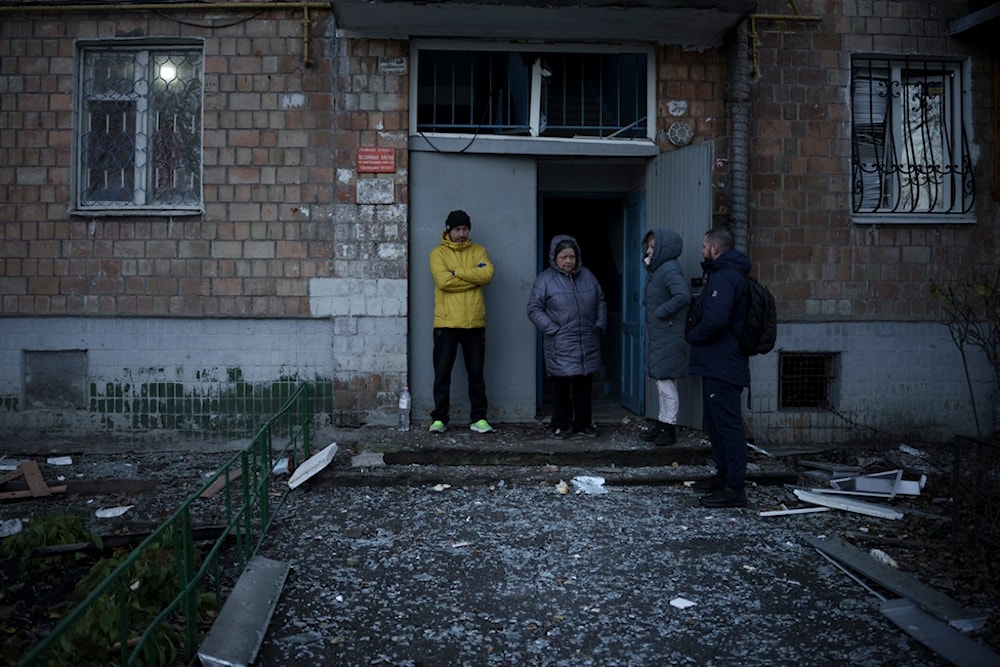New aid vows to Kiev hit lowest as focus shifts to 'Israel': Study
Ukraine's allies have significantly reduced their commitments to provide new aid to the country, despite repeated promises of unhindered support.
-

People stand amid glass from broken windows of their apartment building following a Russian drone attack in Kiev, Ukraine, Saturday, Nov. 25, 2023 (AP)
Ukraine's allies have significantly reduced their commitments to provide new aid to the country, reaching the lowest levels since the beginning of the war, according to the Ukraine aid tracker from the Kiel Institute.
The Institute reported a nearly 90% decrease in new military, financial, and humanitarian aid pledged to Ukraine between August and October 2023 compared to the same period in 2022. This decline marks the lowest since the start of the war in February 2022.
The slowdown in support for Ukraine is evident as Western backing shows signs of weakening. The anticipated Ukrainian counteroffensive has not produced the expected breakthrough, and global attention has shifted to the Israeli war on Gaza.
The Kiel Institute's data reveals that newly committed aid from August to October 2023 amounted to only 2.11 billion euros, marking an 87-percent year-on-year drop. Among the 42 donor countries tracked, only 20 have pledged new aid packages to Ukraine in the past three months, representing the smallest share since the war began.
The Kiel Institute emphasized that, given the uncertainty surrounding further US aid, Ukraine's hope rests on the EU passing its long-announced 50-billion-euro support package. Any additional delay in this support would "clearly strengthen" Russia's position.
Read more: Ukraine may lose war if US funding falls through: Yermak
Conflict in Congress over the direction of funds
In the US, Senate Republicans are blocking additional funding for Ukraine due to a disagreement with Democrats over US border security.
During a classified briefing on Ukraine, a group of Republican senators left the session after it turned into a row over the border crisis, following President Volodymyr Zelensky's unexpected cancelation of a videolink appearance to appeal for continued US funding. Zelensky intended to provide updates on the war in Ukraine and garner support for an upcoming procedural vote on an emergency aid package exceeding $60 billion for his country.
Congress is facing peak divisions over providing support to Ukraine amid the ongoing war, marking the most significant split during the nearly two-year duration of the crisis as Ukraine is rapidly depleting the military aid previously supplied by the United States.
Senate Republicans are conditioning their endorsement for additional funding to Ukraine on the condition that Democrats, led by President Joe Biden, agree to implement reforms in the asylum system and enhance border security—proposals that the Democrats have already opposed.
Senator Romney highlighted the frustration among Republicans, stating that some are leaving briefings because the participants are unwilling to engage in discussions essential for reaching a deal.
The White House also told Congress on Monday that unless Congress adopts its supplementary budget request, it would run out of money to give military help to Ukraine before the end of the year.
Shalanda Young, Director of the Office of Management and Budget, wrote to Speaker Mike Johnson and other House leaders that as more equipment is sent to Ukraine, there is no "magical pot of funding" to address the need. "We are out of money - and nearly out of time."
Read more: Big consequences if US 'pulls the plug' on Ukraine, Kirby says
EU's unsustainable monetary plan for Ukraine
In the EU, negotiations on a 50-billion-euro package ($53 billion) for Ukraine over the next four years are facing delays.
The European Union's military expenditures reached a record 240 billion euros ($260 billion) last year, in response to the war in Ukraine, according to the European Defense Agency (EDA).
The figure marked a six percent overall increase from 2021, with the EU's 27 member states boosting their acquisitions of new military equipment. The EDA reported that six countries raised their spending by over 10 percent, including NATO applicant Sweden, which increased by over 30 percent.
EU foreign policy chief Josep Borrell, who leads the EDA, emphasized the need for armed forces to be prepared for a more demanding era, advocating increased defense investment. However, Borrell cautioned that despite the uptick in spending, the EU still faces "key capability gaps" and lags behind other global players.
EU countries have depleted their stockpiles by sending weaponry worth tens of billions of euros of aid to Ukraine in the war with Russia. The EU is working to enhance production capabilities to meet the increased demands of the war, urging member states to sign joint contracts and collaborate on orders for military equipment.
However, building industrial capacity is a time-consuming process, and the EU is expected to fall short of its target to send one million shells to Ukraine by March.
Read more: US Senate fails to advance supplemental bill failing Ukraine, 'Israel'

 5 Min Read
5 Min Read









